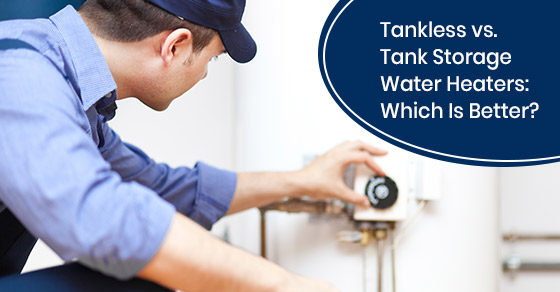 21
Sep 2020
21
Sep 2020
Tankless vs. Tank Storage Water Heaters: Which Is Better?
A water tank is a vast reservoir of water typically located inside a home used for holding and heating water. Presently, there are several options available on the market. However, the two most common designs that many consider are tankless and tank storage water heaters. There is a difference between these two tanks, though. The most apparent distinction is how the water is heated.
Before choosing to purchase water heaters, there is much to be considered. Also, there must be an understanding of how each tank works and how it will benefit your family’s size. Tankless heaters are generally well suited for smaller families that use less hot water. For larger families, tank storage water heaters are great, as they are more efficient in producing water for higher consumption.
A water heater is a pricey investment; hence, homeowners need to consider all of their options when shopping. Below, we offer specific details on each type of tank.
What is a tankless water heater?
A tankless water heater is a unique tank that works on demand. This means that the water is only heated when your faucet or shower is turned on. The water is not stored in a tank, but heated with burners that promptly increase the water temperature. Many opt for these types of tanks, as they have found them to be much more cost-efficient since they use less energy.
What is a tank storage water heater?
A tank storage water heater is much different than the tankless heater. It uses natural gas or electricity to fuel its functions. Unlike the tankless heater, it does not heat water on an as-needed basis. Alternatively, it houses over 115 litres of heated water in preparation for household use. The water is then distributed through a pipe, which conducts water to places like the bathroom and kitchen.
How advantageous is a tankless heater?
The benefit of using a tankless heater is that it enables homeowners to save on their utility bills over time. This is especially true for homeowners that use less than 155 litres of water per year. Furthermore, these tanks generally last for up to 30 years, depending on the quality of water. Hard water tends to deplete the lifespan of these tanks.
Tankless water heaters are also small and compact. Hence, regardless of the size of your home, they can fit in any space. Although small, they carry significant power and rapidly heat water when required. You will not have to wait an extended period for water to warm.
What are the cons of a tankless heater?
Much like anything else, there are drawbacks to having a tankless heater. When initially installing a tankless heater, especially when replacing a traditional storage heater, the cost can be high. This is mainly due to the removal of the old tank and the difficulty of replacing or relocating existing pipes. Hence, for individuals concerned about cost, this reality may be a drawback.
Another downside is the limited heat supply offered when various demands for hot water are made at once. Thus, the simultaneous use of faucets, showers, or washing machines may limit its performance. As a result, the tank may not be able to keep up with the demands for hot water.
What are the benefits of a tank storage water heater?
There are quite a few benefits to having a tank storage water heater. The fundamental reason is the reduced installation cost. Unlike a tankless water heater, the upfront cost is less. Additionally, a tank storage water heater requires less upkeep, as its functions are not as complicated as those performed by tankless heaters. Therefore, should the need for repairs or replacements arise, they are less expensive to maintain.
Disadvantages of a Tank Storage Water Heater
One of the clearest disadvantages to having a tank storage water heater is the amount of space it takes up in a home. Many have known this type of water heater to be bulky and quite large. It does not offer the same compact design as the tankless heater. This is mainly due to its need to collect large quantities of water.
Another drawback to having a tank storage water heater is the impact it can have on the utility bill. They use a vast amount of energy and heat to keep water at a specific temperature. Furthermore, in homes with family members that take consecutive showers, the hot water will not last. Hence, someone is likely to suffer the experience of a cold shower.
As far as endurance, a tank storage water heater must be replaced more often than a tankless heater. They last 10–15 years, which is about 50% less than the lifespan of a tankless water heater. Thus, when choosing this option, it is essential to take such facts into consideration. Although the initial cost is low, this selection can become quite expensive over time.
Brothers Plumbing Can Help You to Make the Right Decision
As emphasized, purchasing a water heater is an investment that requires your complete understanding. After all, it is a choice that you will have to live with for the next few years, unless you decide to change it prematurely. However, to avoid unwanted costs, it is always best to know each option’s advantages and disadvantages.
A tankless water heater has its advantages for individuals looking for a compact design that will save them on costs in the long run. However, it is not quite suitable for larger families that have high hot water usage. A tank storage water heater is less expensive to install and to maintain. Unfortunately, they do not last for long, and they can increase utility bills.
Here at Brothers Plumbing, we understand the importance of making this decision. Our team of experts can help you with the installation, upkeep, and selection of your water heater. For more information on water heaters, contact us.
